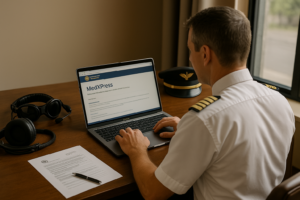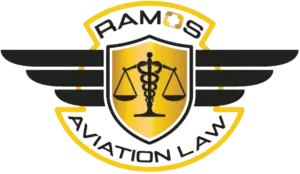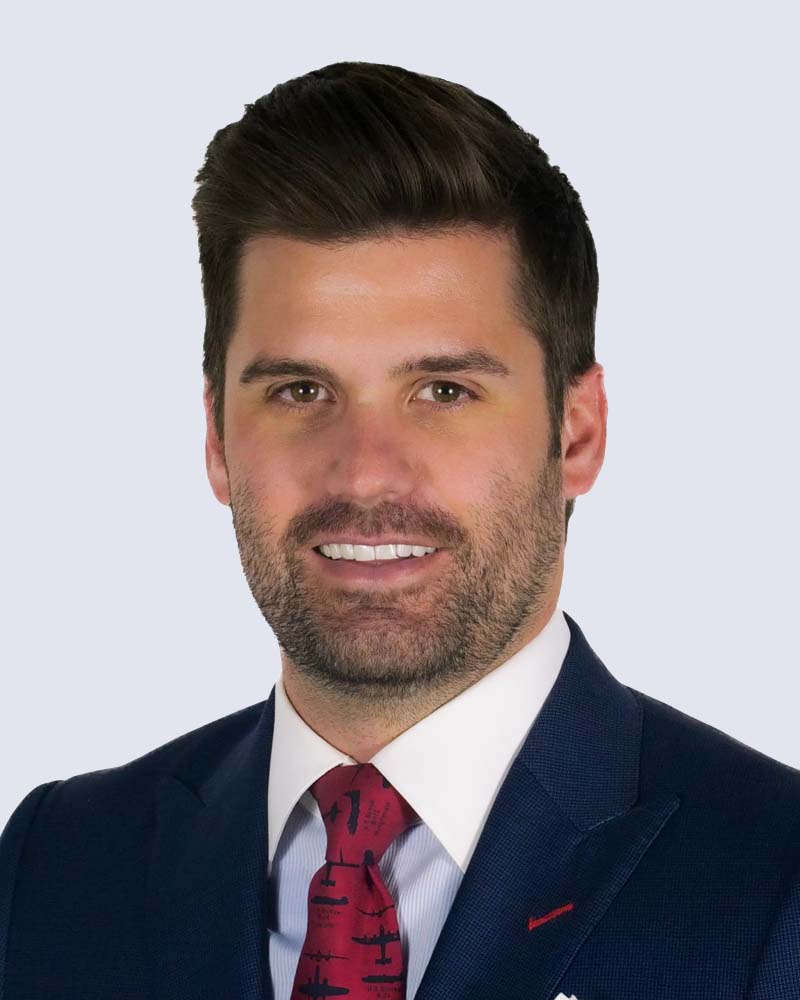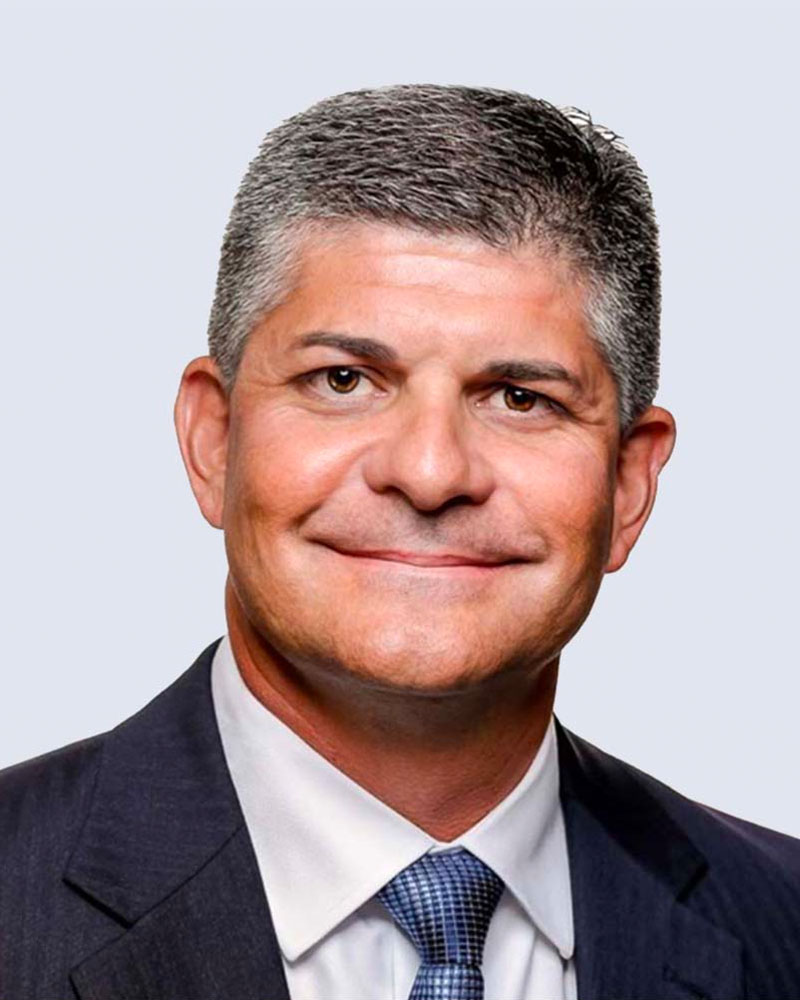FAA Medical Certificate Denial, Suspension & Enforcement Defense
Schedule a Free ConsultationFAA Medical Certificate Defense
We specialize in defending professional pilots facing challenges with their FAA medical certificate. Whether you’re dealing with a First-, Second-, or Third-Class Medical Certificate denial, a Special Issuance request, allegations of falsification on your medical application, or complications related to a mental health condition, our experienced aviation attorneys are here to protect your career and ensure compliance with FAA regulations.
For ATP certificate holders operating under Part 121, avoiding any lapse in your medical certification is crucial to maintaining your ability to fly commercially. Our attorneys have successfully defended pilots from FAA enforcement action and assisted in navigating the FAA’s complex medical certification process.
Not sure how your medical disclosures will affect your FAA medical certificate application? Our confidential MedXPress Simulator helps you evaluate your answers before submitting your real application. It’s free to use and provides the option to consult with one of our aviation attorneys should you choose to move forward with legal representation.
Additional Practice Areas Listed
- Aircraft Crashes
- FAA Drug & Alcohol Event Reporting
- NTSB Appeals
- Personal Injury
- Consumer Law
- Civil Penalties
Aviation Areas of Expertise
Pilot Certificate Actions & FAA Enforcement
Issues with your FAA medical certificate often intersect with broader pilot certificate actions. If you’re facing any enforcement action from the FAA, we can provide comprehensive defense services to protect your career and your certificates.
FAA Certificate Enforcement Actions
We can assist you in handling pilot certificate actions, including the following types of letters from the FAA:
- Notice Of Proposed Certificate Action
- Letter of Investigation
- Emergency Order of Suspension or Revocation
These issues typically have short deadlines and require prompt, professional responses. Our aviation lawyers act quickly to protect the rights of the certificate holder. We provide pilots, air traffic controllers, operators, and mechanics with representation in the earliest stages of pilot certificate actions and throughout the entire hearing and appeal process. This includes representation in communications with all FAA personnel.
Notice of Proposed Certificate Action
If you’ve received a Notice of Proposed Certificate Action (NPCA) or a Notice of Proposed Civil Penalty (NPCP) from the FAA, it means the agency believes you have violated Federal Aviation Regulations (FARs). The notice may outline the alleged violations identified through an FAA investigative report and include a response deadline. It’s critical to contact an aviation attorney immediately to understand your options and avoid significant penalties.
Our aviation attorneys can guide you through settlement options, risk assessment, and litigation, while protecting your career or business. Our team, led by pilots, offers the expertise needed to effectively navigate the investigation, NPCA response, and any subsequent appeals before the DOT Administrative Law Judge, NTSB, or U.S. appellate courts.
FAA Medical Certificate Denials
Pilots holding an ATP certificate must maintain a First-Class Medical Certificate to operate under Part 121, and if your medical certificate is denied, suspended, or revoked, it can severely impact your career. Pilots holding Second- or Third-Class Medical Certificates can also be greatly affected by the loss of that certificate.
The process of appealing a medical certificate denial, suspension, or revocation involves navigating complex legal procedures, potentially including the NTSB appeal process. At Ramos Law, our experienced aviation attorneys are committed to protecting your career during the appeal process, whether you’re facing a medical denial or certificate action like an Emergency Order of Suspension or Revocation.
We provide skilled legal representation, ensure deadlines are met, and guide you through the hearing process. With our in-depth knowledge of aviation law, we can effectively present your case before the FAA and, if needed, an ALJ or the full NTSB board to secure the best possible outcome related to your airman certificates.
Special Issuance (SI) & Statements of Demonstrated Ability (SODA)
For medical certificate holders with disqualifying medical conditions, obtaining a Special Issuance (SI) or Statement of Demonstrated Ability (SODA) is essential to flight operations. These pathways provide pilots a chance to demonstrate their fitness for duty and receive their medical certificates, but navigating the process can be complicated.
The Special Issuance process requires pilots to submit detailed medical records and undergo frequent medical evaluations to demonstrate they are fit to fly despite a potentially disqualifying condition. Additionally, ongoing monitoring and compliance with other FAA requirements are necessary to maintain the validity of a Special Issuance certificate.
A Statement of Demonstrated Ability (SODA) could be a great option if you have a static, non-progressive medical condition, allowing you to keep your medical certificate without the full Special Issuance process. Unlike Special Issuances, which require ongoing monitoring, a SODA is designed for conditions that aren’t likely to worsen, giving you a more straightforward way to maintain your flying privileges.
Note: SODAs are generally only issued for static physical conditions (e.g., monocular vision or limb loss) and are not granted for mental health or progressive disorders.
Allegations of Falsification on FAA Medical Applications (FAR 61.59)
Falsifying information on an FAA medical application under FAR 61.59 is a serious offense with the potential for certificate suspension, revocation, and even criminal prosecution. If you’re facing allegations of falsification, it’s critical to have skilled legal counsel to defend your rights and protect your career. It’s important to note that the FAA must prove the falsification was both knowing and intentional, which can be a critical factor in your legal defense.
Once implicated, consequences may include the suspension or revocation of your pilot certificate and significant civil penalties. Additionally, it could result in criminal charges under federal law, potentially ending your career in aviation.
Substance Dependence/Abuse & The HIMS Program
Substance abuse or dependence can severely impact your FAA Medical Certificate. However, pilots diagnosed with substance-related issues may be eligible to participate in the HIMS program, which offers a pathway to regain medical certification.
The HIMS program (Human Intervention Motivation Study) is a rehabilitation program for pilots recovering from substance abuse or dependence, allowing them to regain their FAA medical certificate. Enrollment is typically initiated by an AME (Aviation Medical Examiner) or employer, and the FAA requires sustained sobriety and strict compliance with the program’s protocols before reissuing a medical certificate.
The HIMS program involves evaluation, treatment, and ongoing monitoring to ensure pilots meet FAA safety standards. Successful entry into the HIMS program enables pilots to return to flying as long as they comply with FAA requirements.
If you’re navigating the Special Issuance process, it’s important to know that you will be required to undergo a thorough evaluation, treatment, and ongoing monitoring to regain your medical certification. Navigating these requirements can be complex, and any misstep could delay or jeopardize your recertification.
An experienced aviation attorney can help you ensure full compliance with HIMS protocols and guide you through the process. With the right legal support, you can increase your chances of successfully returning to the cockpit.
Mental Health Conditions & FAA Medical Certification
In addition to substance dependence and abuse, the HIMS program is also used to evaluate and monitor airmen with certain psychiatric conditions. Mental health conditions such as depression, anxiety, PTSD, and ADHD can impact your FAA medical certification. The FAA requires comprehensive evaluations and documentation to ensure you’re fit to safely operate an aircraft, even if the condition is well-managed. These conditions may lead to delays in obtaining certification, additional evaluations, or the need for specialized treatment plans, all of which can complicate the certification process.
In some cases, the FAA may require neuropsychological or psychiatric evaluation to assess cognitive function and ensure you are mentally fit to safely operate an aircraft. Neuropsychological testing helps evaluate any potential cognitive impairments related to conditions like depression, ADHD, or PTSD, and plays a crucial role in determining whether you meet the FAA’s standards for medical certification.
DUI/Alcohol-Related Offenses & Mandatory Reporting (FAR 61.15)
If you’ve been charged with a DUI or another alcohol-related offense, FAA regulations, specifically FAR 61.15, require you to report it within 60 days. This report must be submitted to the FAA’s Security and Investigations Division and disclosed again on your next FAA medical application (Form 8500-8).
Failing to comply with this reporting requirement can lead to severe consequences, including suspension or revocation of your airman certificates. An experienced aviation attorney can guide you through this complex process, ensuring you meet all FAA reporting obligations while safeguarding your career.
Our team specializes in handling DUI-related cases for pilots, helping you navigate the federal law reporting requirements and the 8500-8 disclosures. We understand how the FAA reviews DUI offenses and proactively help pilots secure the necessary treatment and evaluations. With our skilled legal representation, we can negotiate with the FAA on your behalf, minimize penalties, and work to prevent lasting damage to your certificates and flying privileges.
Failure to Comply with a Special Issuance Medical Certificate
Failure to comply with the conditions and limitations of a Special Issuance medical certificate can result in severe consequences for pilots, including immediate grounding and potential FAA certificate action.
It’s critical to fully understand and adhere to all requirements outlined in your Special Issuance, as any non-compliance can jeopardize your ability to fly. Our experienced aviation attorneys can help resolve compliance issues and work to restore your medical certification, protecting your career and pilot certificates.
Contact Ramos Law Aviation Division
As a licensed and active pilot himself, aviation attorney Joseph LoRusso understands firsthand the FAA regulations for safety, as well as the technical operation of an aircraft. Whether you’re facing an FAA investigation after an accident or pursuing compensation for injuries, our team has the legal and aviation expertise to assist with both enforcement defense and personal injury claims.
Along with being both a board-certified emergency room physician and a licensed attorney, our Founder, Dr. Joseph Ramos, is also an avid pilot. Dr. Ramos’s unique combination of knowledge and skills gives our firm a deep understanding of the life-changing impacts of injuries in the aviation field.
Our team has extensive experience helping accident and injury victims obtain compensation to pay for medical bills, lost wages, and pain and suffering.
FAA Medical Certificate Frequently Asked Questions
The FAA medical certification process for pilots involves a thorough medical evaluation to ensure the pilot meets the physical and mental health standards necessary for safe flight operations.
- If your medical certificate is denied, you may be able to appeal to the NTSB through a formal hearing process. Our legal team can help guide you through the appeal process and advocate for your case.
The Special Issuance process allows pilots with disqualifying medical conditions to maintain their medical certificate by meeting specific documentation and monitoring requirements. Our firm can assist in navigating this process. A special issuance is a medical certification procedure for pilots with disqualifying medical conditions. It involves submitting comprehensive medical documentation and may require extensive review to confirm that the pilot can safely exercise the privileges of their certificate and any potential risk posed to aviation safety can be effectively mitigated through monitoring.
- The HIMS program is a structured recovery program for pilots with substance abuse issues. It includes treatment, monitoring, and aftercare, allowing pilots to regain their medical certificate and continue flying.
Falsifying information on your medical application can lead to certificate suspension or revocation, significant civil penalties, and even criminal prosecution. Our team can defend you against such allegations.
If you have been convicted of a DUI, you must report it to the FAA under FAR 61.15. Our attorneys can help guide you through this reporting process and mitigate potential penalties.
Yes, pilots with mental health conditions like ADHD or depression may still qualify for a First-Class Medical Certificate if they meet the FAA’s documentation and treatment requirements. Our firm can help navigate these requirements.
The FAA’s processing times are often extended due to rigid regulatory requirements and the high volume of cases. However, the recent FastTrack initiative aims to expedite the evaluation of certain mental health conditions.
Yes, pilots diagnosed with PTSD or similar conditions can still pursue certification, but it typically involves additional psychological assessments and potential Special Issuance.
Pilots should assemble thorough medical records, provide accurate disclosures of their health history, and consider seeking legal guidance to navigate complicated certification matters more efficiently.
Yes, ADS-B technology facilitates public flight tracking, which raises privacy concerns. Nonetheless, it also improves safety by enabling real-time monitoring of flights by family and friends.
Contact Our Aviation Attorneys
Request a Consultation
MedXPress Simulator
Do You Wish an Attorney Could Review Your MedXPress
Before Submitting to the FAA?

The Pilot’s Guide to FAA MedXPress: Before, During, and After Submission
The Pilot’s Guide to FAA MedXPress For every pilot, from the aspiring student to the seasoned airline captain, an FAA medical certificate is a non-negotiable

Aviation Accident Litigation Challenges
Plane crashes are among the most devastating and complex types of personal injury cases. The intricate nature of aircraft mechanics, multiple parties involved, and strict
Need Help With an FAA Medical Issue? Our Aviation Attorneys Are Standing By.
Your right to fly matters. Let our experienced aviation attorneys help you protect your certification and your future.


